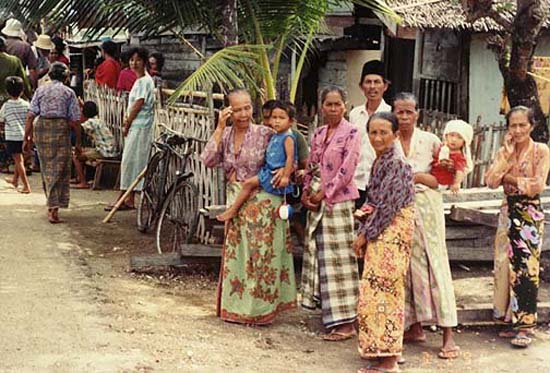
Thomas P. Rosandich worked to develop a plan to bring the Peace Corps to Indonesia. The result was the first Sport Corps under the general umbrella of the Peace Corps
In 1960 I accepted an assignment from the Republic of Indonesia to coach their track and field athletes for the Fourth Asian Games that were to be hosted in Jakarta in 1962. R. Maladi, the Minister of Sport, hired a marvelous balance of coaches from both the Eastern Bloc and the West. He selected coaches from countries that were world sport powers at that time: Americans in track, swimming, basketball, boxing and tennis; East Germans in cycling and wrestling; Yugoslavs in soccer; Soviets in weightlifting, volleyball and water polo; etc. It was the most talented group of sport coaches that I have ever had the privilege to work with, particularly those who came out of the Eastern European sports academies with their strong background in sport science.
We came out of the Fourth Asian Games with many gold medals and records in track and field. Equally important, Minister Maladi gave me the resources to develop the Asian Track and Field Coaches Association, which is headquartered today at the Indian Sports Institute in Bangalore. I continue to serve as the honorary president. The Academy recently signed a protocol with this institute which is an educational exchange agreement in instruction, research and service.
Minister Maladi also provided me with the resources to build the Indonesian Sports Academy using the international coaching staff as a faculty. This group had already provided a classic example of sport transcending politics by working together to prepare the Indonesian athletes for the Asain Games, the first of many major international meets hosted by Indonesia. Eventually, Maladi asked me to serve as the liaison between his Ministry and the coaches. As with the State Department, our objective in every country was to train coaches as well as athletes. Working together, we developed a curriculum that was a balance between sport education as in the East and West. In essence, the sport coaching and sports medicine programs developed in Indonesia were the basis for the Academy's curriculum in these same disciplines.
We designed and built a facility, wrote the curriculum, and developed a faculty, all under the sponsorship of the University of Indonesia. I eventually enrolled in the program in an effort to learn as much as I could about the East European coaching and teaching philosophies. The new element I picked up from that program, primarily from the Soviets, was in the area of sport psychology. They taught that the ultimate focus of coaching was not technique but the mind, i.e., the mind controls the body. It should be noted that a current Academy Trustee and a Trustee Emeritus taught on that faculty: Don Wukasch, M.D., in the area of sports medicine, and Sally G. Rosandich in English as a second language.
During that same time frame, we worked with Maladi to develop a plan to bring the Peace Corps to Indonesia, which had the third largest communist party after the Soviet Union and China. The result was the first Sport Corps under the general umbrella of the Peace Corps. In a joint agreement between the Ministry of Sport and the Peace Corps, I returned to the U.S., where I completed a nationwide speaking tour on college campuses to select 33 coaches out of pool of over 200 candidates. A number of those Sport Corps coaches, including Vic Godfrey, Jim Noonan and John Second, have subsequently worked for the Academy on international assignments over the years.
After training, these coaches were brought to Indonesia and placed strategically in the capital cities of 21 provinces throughout the archipelago. The volunteers implemented a physical performance testing program, which was used to select and train athletes between the ages of 10 and 21. Ultimately, the data collected produced a great talent pool for sport development in Indonesia as well as baseline data for my doctoral dissertation (which was finalized in 1977 in Bahrain). These data have been used to develop a test manual that is still used throughout Asia from Bahrain to Brunei.
In the summer of 1996 I had the opportunity to return to Indonesia and meet with Maladi to discuss those interesting but turbulent years of the 1960s. Eventually, the communist party tried to overthrow the pro-West generals of President Sukarno, which led to the evacuation of the Sport Corps and the burning of the U.S. Information Service library and the takeover of the U.S. Operations Mission facilities. Indeed, the Indonesian Sports Academy built by the Americans was also destroyed. (During my visit last summer I negotiated with the current Minister of Sport for the development of a new sports academy in that country.)
When the coup started, I was traveling in East Germany with Maladi and the very talented Indonesian track team for a series of competitions. I was probably the first American to see the sport school of East Germany in Leipzig, since there were no diplomatic relations at that time between our two countries. I met with many of my former German colleagues from Indonesia, who provided me with special insights into their program. The visit once again confirmed that sport education was much different from physical education programs taught in the U.S.; there was definitely a need for sport education in America.
While in East Germany I was advised that there were threats upon my family in Jakarta and that the mayor had provided a military cordon around my home. By that time all American families had been evacuated. I left Maladi and the team to fly to Indonesia and evacuate my family. President Sukarno met with my wife and me, urging me to stay or at least come back under a new contract. It became immaterial since Sukarno soon fell in the coup to the communist Army generals who managed to survive the crocodile pits.
